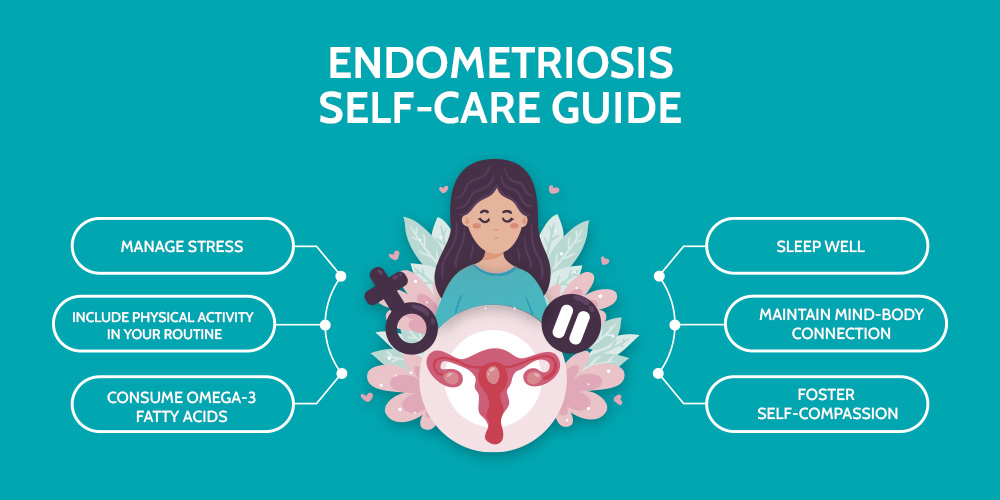Last Updated on March 20, 2024
Introduction
Endometriosis is a chronic inflammatory, painful condition in which the tissues that normally line the uterus (the endometrium) develop outside the uterine cavity. The persistent stress accompanying endometriosis can have a significant impact on various aspects of your life. Hence, it is crucial to go beyond medical therapies and incorporate an endometriosis self-care guide to improve overall well-being.
Although there may not be a cure for endometriosis at this point, various research organizations are looking into potential new endometriosis treatments to help women alleviate the challenging symptoms associated with the condition.
Before we delve into the specifics of this endometriosis self-care guide, let’s first take a closer look at the significance of endometriosis and its associated symptoms.
What Makes Endometriosis Self-Care Essential?
Self-care is known as the ability and practice to take care of your own emotional, physical, and social health.
Endometriosis is an incurable chronic condition; therefore, self-care is essential for managing your symptoms to help ease the discomfort and enhance wellness. However, several triggers such as environmental toxins or high caffeine can make the condition worse contributing to endometriosis flare-ups.
Also read: ENDOMETRIOSIS VS FIBROIDS: KNOW THE DIFFERENCE
Common Symptoms of Endometriosis
The severity may vary among different individuals. Some of the symptoms include:
- Pelvic pain either in your lower tummy or back
- Heavy bleeding during menstruation
- Infertility
- Pain following sex
Uncommon Symptoms of Endometriosis
However, some of the uncommon symptoms of endometriosis may include:
- Chest pain
- Difficulty in breathing
- Changes during urination
- Digestive problems such as constipation, bloating, diarrhea
It is crucial to realize that the intensity of symptoms does not necessarily relate to the condition’s severity.
Also read: PCOS vs Endometriosis: Women’s Health Spotlight
Endometriosis Self-Care Guide
Self-care for endometriosis can be independently adopted at home, regardless of guidance from healthcare providers.
Some of the best endometriosis self-care practices are listed below:
Stress Management:
Effective management of stress levels can eliminate inflammatory processes associated with endometriosis. However, certain activities such as leisure time with friends and family, indulging in hobbies, listening to music, and practicing meditation can lessen stress levels.
Physical Movement:
Incorporate regular physical activity to exhibit anti-inflammatory effects which may help manage endometriosis better. While exercising may not be your immediate preference during times of discomfort, still aim to engage in physical movement for thirty minutes each day. Research suggests that women who actively participated in physical activity at least thrice a week were reported to have reduced pain levels. Moreover, exercise helps to maintain a healthy weight. It is noteworthy to realize that endometriosis itself is not a direct cause of weight gain. However, some women may go through certain changes in weight due to factors such as poor lifestyle, hormonal fluctuations, or the use of certain medications.
Opt for a Healthy Diet:
Consumption of omega-3 fatty acids in your diet can be extremely beneficial for managing endometriosis symptoms. The essential fatty acids in foods like mackerel, salmon, sardines, walnut, and salmon, all possess anti-inflammatory properties. Research indicates that adopting a low-fat, predominantly plant-based diet abundant in fiber and antioxidants can contribute to a reduction in overall endometriosis symptoms.
Maintain Mind-Body Connection:
Try to build a connection between mind and body through mindfulness practices such as yoga or tai chi, which may help in enhancing the overall quality of life for individuals with endometriosis.
Foster Self-Compassion:
Practice self-compassion and try to keep track of your monthly period and endometriosis. This can help you get an idea of when you may experience the most pain. Besides, it is essential to be gentle with yourself throughout the condition.
Good Quality Sleep:
Ensure prioritizing a good night’s sleep as much as possible. However, it can be a challenge with nighttime endometriosis symptoms, but good sleep quality sleep can improve symptoms for the better. Research suggests that women with endometriosis are twice as likely to experience fatigue as compared to those without the condition. This fatigue also has been associated with elevated insomnia. To enhance good quality sleep, establish a consistent bedtime routine, create a quiet and dark room environment, and avoid consuming large meals. If these conventional approaches prove ineffective, incorporating relaxing nighttime rituals may offer potential relief. Indulging in a bath infused with lavender and chamomile oils, known for their muscle relaxation properties. Additionally, bathing with Epsom salts can help alleviate pelvic and abdominal pain which can ultimately result in good quality sleep.
These are some endometriosis self-care guidelines, discover what works best for you.
When to Apply Endometriosis Self-Care?
Engaging in endometriosis self-care is crucial at every stage of your condition, however, these practices are particularly essential during specific events such as:
- Flare-Ups: Endometriosis flare-ups demand the increase of endometriosis self-care practices the most to eliminate pain and manage symptoms effectively.
- When Taking Medications: Medication is not a complete cure, therefore, self-care methods alongside medication are crucial to effectively manage the symptoms.
- After Surgery: You may utilize endometriosis self-care practices post-surgery to reduce elevated pain that may be heightened after surgery.
Also read: Birth Control For Endometriosis: Does it Work?
Outlook
Endometriosis management can be challenging at the same time. 190 million women and girls in their reproductive age are afflicted with this complex and chronic condition.
Although it is incurable and cannot be eradicated, you may adhere to the endometriosis self-care guide to manage your symptoms as a whole. Additionally, it is essential to remind yourself to be gentle with yourself, now and then. Engage yourself in healthy practices, be physically active, reduce your stress levels, and never forget to love yourself throughout the way. That said if you cannot control your symptoms, you may consider asking your physician or finding an endometriosis specialist near you, especially if you are attempting to conceive right now or would like to in the future.





